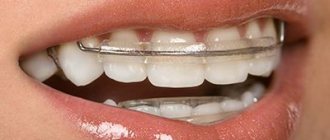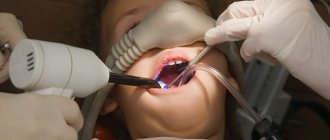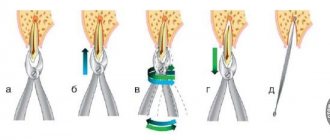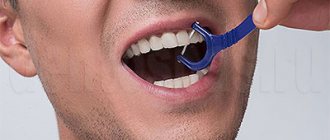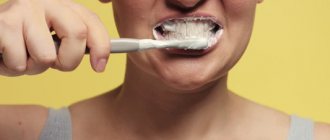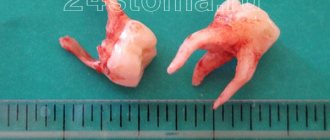The other day we received a question: “I turn white and pale when my tooth starts to hurt. I endure for a long time and yet, 2-3 days before going to the dentist, my heart jumps out of my chest! No matter how much you inspire, no matter how you convince yourself, nothing helps. Valerian and pepper are also powerless... I don’t know what to do, I urgently need to treat pulpitis and caries..."
Our dentists always answer questions from the Internet. But this time they did not immediately find what to answer. We sat in the resident’s room, drank tea, and the discussion resulted in this little note for patients.
The answer to this question is both simple and complex at the same time. But everyone must answer it themselves and overcome their fear. We are not psychologists, but we will try to help a little with this and give some practical advice.
Drinking alcohol
No matter how much you are afraid of dentists, you should not drink “for courage” before going to the clinic. Alcohol and anesthesia are incompatible things. It happens that the anesthetic simply does not work because it is blocked by alcohol. For this reason, you should not drink alcohol for at least 12 hours before visiting your doctor.
If you are very worried about fear, then fight it in other ways. For example, you can sign up for a consultation, and before the procedures, talk to the doctor and just sit in a chair. It should also be understood that modern dentistry has stepped far ahead compared to what it was even 10-15 years ago. The effectiveness of the techniques has increased dramatically, and pain, both during the procedures and after their completion, has been minimized.
What do you need to know before going to the dentist?
Visiting the dentist is a fear for many. To make your visit to the doctor as effective as possible and to be fully prepared, you need to remember some rules. Specialists at the Happy Smile clinic tell you in detail what you need to know before going to the dentist.
There's no need to be afraid
Modern dentistry has methods of pain relief that reduce discomfort and pain during treatment, prosthetics, and even tooth extraction to zero. Some people are afraid of injections, but even here there is practically no pain, since doctors use the following methods:
- injections are performed with special syringes with thin and sharp needles;
- the injection site is pre-treated with a spray or gel with an anesthetic;
- for easier penetration of the needle, the mucous membrane is dried;
- the medicine is administered gradually, slowly, so that it accumulates at the site of inflammation.
Lidocaine and novocaine in modern dental clinics are replaced by new generation drugs with a more powerful effect, so the patient does not feel anything even with complex molar removal.
When choosing dentistry you need to consider:
- availability of high-quality multi-profile equipment;
- range of services provided;
- professionalism, skill of specialists.
Dentistry Happy Smile is one of the leading dental clinics, where services are provided for treatment, whitening, prosthetics, implantation, and tooth extraction. The medical center employs highly specialized dentists who regularly improve their skills and provide services at the highest level.
Is it possible to eat before going to the clinic?
If the treatment will take place under anesthesia, it is necessary to have a snack. This is due to several reasons:
- Less saliva is produced. Dry mucous membranes are necessary for fillings and diagnosing certain diseases. If a person is hungry, he is provided with increased salivation;
- Immediately after therapy you cannot eat for 1-2 hours, so it is advisable to eat before the procedure so as not to feel hungry later.
Excessive consumption of food is also not advisable before taking it, otherwise nausea and vomiting may occur, especially in people with a sensitive reflex.
Eating is strictly prohibited if the treatment is carried out under anesthesia. The anesthesiologist should tell you detailed rules for preparing for this procedure.
Can I drink alcohol?
Some people believe that if you drink a little alcohol before going to the dentist, dental treatment will not be so scary. In fact, drinking alcohol is strictly prohibited, at least 24 hours before a dental procedure. It can block the action of the pain medication, making treatment painful or even impossible.
It is also worth remembering that the dentist has every right to refuse to treat a patient who is intoxicated.
What should you not do before going to the dentist?
- Try to drown out bad breath with mints, chewing gum and other methods. Odor is one of the diagnostic criteria that in some cases helps the dentist make the correct diagnosis;
- Taking painkillers. If you have to visit a doctor because of acute pain, you should stop taking any painkillers a few hours before leaving home. For a dentist, pain response is important. It evaluates the severity, intensity, and speed of onset of pain when exposed to irritants, and tablets significantly complicate diagnosis.
- Conceal information from your doctor about taking medications, especially blood thinners. Otherwise, there is a high risk of bleeding and other complications. Sometimes the dentist recommends stopping such medications for a while and scheduling a visit for another time.
- Hide information about the presence of an allergic reaction, existing diseases of internal organs, hereditary pathologies, the presence of menstruation, menopause. All this may affect further therapy.
What should you take with you?
You must come to any medical institution with a passport or medical insurance. It is advisable to have SNILS with you in paper or electronic form. Also, be sure to take with you the results of x-rays, previous studies, if they were not carried out in this clinic, conclusions and recommendations of the doctor.
You need to plan your appointment in advance
A trip to the dentist should be planned in advance, otherwise, if the doctor does not have a free window, the patient may simply not be seen. The exception is cases with acute pain. In this case, the doctor cannot refuse an examination.
The duration of the visit depends on the complexity of the procedure. A regular examination lasts on average 15-20 minutes, professional cleaning up to 1 hour, treatment can take more than 60 minutes. It is better to arrive early in order to have time to complete all the necessary documents. If a patient is late or cannot come to the clinic, this should be reported.
When should you not go to the dentist?
It is better to postpone going to the dentist in the following cases:
- the presence of herpes, elevated body temperature;
- viral diseases of the respiratory tract;
- period of menstruation in women;
- nasal congestion or severe runny nose;
- excessive drinking on the eve of the visit;
- bad feeling.
In the office, you should calm down, answer all questions clearly and truthfully, and follow all the instructions of the attending physician. Only in this case will a trip to the dental center be easy and painless.
There's nothing to eat
For some reason, many people think that they should not eat before dental or any other treatment. This is wrong. You can’t eat before taking a general blood test, but you can and even need to eat before going to the dentist. If you go to the doctor on an empty stomach, then after the anesthetic is administered you may feel dizzy and feel ill. To prevent this from happening, be sure to have a snack. Moreover, you cannot eat food for several hours after the procedures.
What is dental phobia and who is most afraid of it?
Over the past decade, the range of medicines and methods of practical dentistry has expanded significantly. Now in its arsenal there are effective technologies, high-quality devices, new materials that can not only guarantee the quality of treatment, but also ensure its comfort.
Despite this, one of the most common reasons for refusing to visit the dentist remains dental phobia - the patient’s fear of dental intervention. From medical practice we know that 90% of adults have a fear of pain, they anticipate it, even when they don’t see the instruments yet, just think about treatment!
There are interesting statistics on this: managers at various levels are most afraid of dentists - about 67% and housewives - 72%. And the bravest, in this regard, are military personnel - 72% of them are not afraid of us =).
It's true. Our doctor, Diana Levchuk, at the very beginning of her career, worked in a dental clinic and received conscripts from the nearest military unit. Maybe it was her gentle approach, of course, but they were very happy when they got into her office =). Perhaps this is due to the hardships of service, but a fact is a fact.
Take painkillers
If painkillers have not been prescribed by your doctor, then before going to the dentist it is better not to take them at all. It is clear that toothache is very unpleasant and painful, but if you drink a painkiller before going to the dentist, the anesthesia may not work or may not be fully effective. As a result, treatment will have to be delayed.
You can take a painkiller 6 hours before your dentist appointment. Then, if the pain returns, you can brew yourself some soothing chamomile tea.
But this rule is valid only if the doctor did not prescribe anything to you. If the dentist himself prescribed you pills, take them without fear.
What not to do before visiting the dentist
The man lay unconscious. The assistant rubbed his temples and forehead with ammonia, and the doctor stood a step away and fanned him with a towel. When the patient came to his senses, he reluctantly admitted: “I was advised not to eat anything before the appointment.” There are many different situations that doctors and patients face, but there are 3 that cannot be kept silent about. This letter is about what not to do before visiting the dentist.
________________________________________
Sometimes they are so afraid of dentists that before the appointment they drink one hundred grams of combat dentistry. It seems that my soul is lighter, and not scary at all. But in reality, this “sedative” interferes with treatment.
Alcohol and anesthesia are incompatible. When the doctor administers the anesthetic, it may simply not work. It seems like they gave an injection, but there was no effect. They still prick, but the lip does not go numb. Therefore, drinking 12 hours before your appointment is prohibited.
If you are very afraid of dentists, then do not go for treatment right away. Make an appointment, sit in a chair, talk to the doctor. The fear will quickly disappear and you yourself will want the doctor to help you.
It is unknown who originated this myth, but it exists. They say that you should not eat anything before visiting the dentist. This is wrong. Before a general blood test, they do not eat, and then in the morning. And before visiting the dentist, be sure to eat.
If you go on an empty stomach, you will feel dizzy or lose consciousness when the anesthetic is administered. To prevent this from happening, eat. It’s also worth eating because after taking it you can’t eat for two hours.
When your teeth hurt day and night, painkillers help. But by your own decision, you should not drink them before visiting the dentist.
The fact is that anesthesia and painkillers act on the same nerve fibers, but in different ways. When the doctor administers anesthesia, it will have a worse effect or no effect at all. Therefore, treatment will have to be postponed.
To avoid delaying treatment, take painkillers 6 hours before your appointment. If the pain is severe, drink chamomile tea.
There is an exception to this rule with painkillers - doctor's prescription. If your dentist prescribed a drug and recommended the best time to take it, take it. Don't worry, the doctor knows what he's doing.
⚫ You don’t need to drink alcohol to be brave. This interferes with the effect of the anesthesia. If you are afraid of dentists, do not get treatment right away. Just go for a consultation.
⚫ Be sure to eat before treatment at the dentist. If you don't eat, you may lose consciousness while the anesthetic is injected.
⚫ You should not take painkillers as prescribed. This may delay treatment time.
Why are people afraid of dentists?
Fear, especially panic, traumatizes not only the patient - it is usually transmitted to the doctor.
“I myself begin to get terribly nervous around such patients and it’s much more difficult for me to work, but root canal treatment , for example, is real microsurgery!” says Diana Levchuk.
Probably, in Russia, dental phobia is a more widespread and persistent phenomenon than in foreign countries. According to French scientists: in the surveyed group of patients, consisting of 1,300 people, the greatest concern was caused by procedures for treating the dental cavity and local anesthesia. Moreover, after visiting the dentist, during secondary testing, the degree of anxiety decreased significantly.
What is this if not fear of the unknown? People are afraid not of the things themselves, but of what they have imagined about them =). For patients visiting a dentist for the first time, fear can be caused by the dental office itself and the sight of medical instruments. The fear of pain before visiting the dentist develops at a very early age and, once ingrained, is difficult to correct.
When should you cancel your visit?
If circumstances arise that prevent you from visiting the dentist at the scheduled time, you can cancel the visit and reschedule it for a later date. It is better to inform the doctor or administrator about this as soon as possible so that it is easier for them to adjust the patient’s appointment schedule.
Cancel your visit if:
- you become ill with ARVI, influenza, or any other infectious or viral disease that may be contagious or interfere with treatment;
- your herpes has worsened;
- the nose is very stuffy (for example, due to allergies), and the stuffiness is not relieved with medication;
- with any increase in body temperature;
- when you feel unwell associated with an increase or decrease in blood pressure.
How to calculate the time of the visit?
Preventative examination and consultation usually take no more than 20-30 minutes. If you are seeking comprehensive teeth cleaning, tartar removal, or caries treatment, the appointment time will be 1 hour. If complex treatment is needed, the dose can be extended to 2 hours. Longer procedures (for example, dental prosthetics) are agreed upon by the doctor and the patient in advance.
If you are visiting the clinic for the first time and your card is not there, you should come 15-20 minutes before your appointment. During this time, the administrator will issue a card and enter all your data into it. You need to have your passport with you.
The treatment of many diseases requires several repeated visits to the dentist, and the intervals between them are determined by the doctor (they may depend on the effect of the medications used, healing time, etc.). If you are planning serious treatment, it is better to choose a period when you can freely manage your time and visit the doctor frequently.

